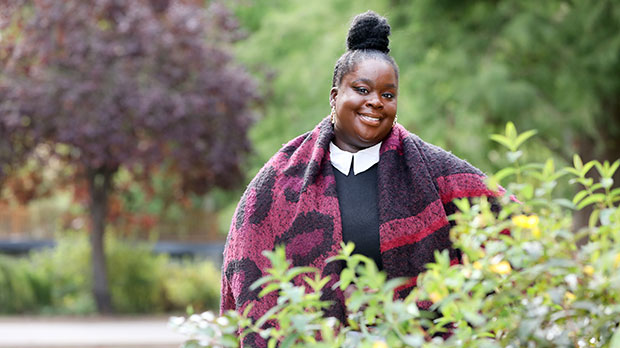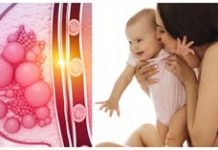
When diagnosed with cancer, deciding how and when to tell people can leave a patient feeling anxious and alone. For some it feels right to tell people individually, but sometimes social media can be a powerful platform.
It can help people reach out to a wide and varied audience, garner support and receive positive feedback.
But having patient information like leaflets and posters that reflect diversity is also important to ensure different ethnic groups are represented and feel listened to.
Adobea’s story
Style vlogger Adobea Obeng decided to open up about her cancer diagnosis on her YouTube channel earlier this year.
She will never forget the moment she was diagnosed with cancer, aged just 31.
“My first thought was ‘I have a son, I can’t have cancer – who will bring him up?”
More devastating still, Adobea was told the disease was incurable.
But as she tried to come to terms with the news, there was a further, unexpected challenge when she struggled to find information about cancer that felt relevant to her.
“When you think about cancer, you don’t really see a face like mine,” she said. “But people who look like me are living with cancer every day, and sometimes dying from it.
“Cancer doesn’t discriminate – black, white, brown, age, height, weight, health nuts, people into their fitness. There’s no one single face of cancer – anyone can get it.”
As she started her treatment, Adobea found it difficult to talk about her illness – partly because she didn’t want people to worry about her and partly because she was in denial. And she didn’t know where to turn for support.
“There is help out there – but I didn’t know it at the time – I wasn’t seeing people like me in the leaflets and posters I was given. I felt as if I was the only one going through this.”
The importance of talking
Social media became an outlet enabling Adobea to share her cancer journey and feel connected.
After treatment, Adobea set up a plus size fashion Instagram and YouTube channel @itsdivinestyle
Normally it’s chatty and upbeat. But in May this year, she decided to tell her cancer story with raw honesty.
“It’s just so important to talk about it. Being vulnerable and open helps bring awareness.
“Since talking about my cancer, I’ve had so many kind words that have really touched my heart. So many people thought they were alone too.”
Now, four years on, the 35-year-old from Romford, is thankful to be on treatment that is keeping her stage 4 breast cancer in check. Three of the drugs used in her treatment Cancer Research UK helped develop.
The road to treatment
 100vw, 150px”></p>
<p class=) Adobea in hospital
Adobea in hospital
Adobea’s road to diagnosis was not straightforward.
In 2016 she found a grape-sized lump in her breast but was advised by a GP that she was young, so it was ‘probably nothing’. By the following year, the lump had grown to the size of a tangerine. She again saw a GP but was told as there was no pain, there was nothing to worry about.
In April 2018, with the lump even bigger, Adobea started to experience back pain. One day on her way to work, she developed a piercing pain in her chest and was finding it hard to breathe. She went to hospital by ambulance, however, doctors said it was musculoskeletal pain and sent her home with painkillers.
Over the next two days, Adobea deteriorated further, dealing with excruciating pain – every breath was agonising. An ambulance was called and this time she insisted on a CT scan.
The following day, a consultant told her she had a 7cm mass in her breast, nodules in her armpit were affected and she was sent for a biopsy.
“Cancer had never entered my head – that was an old person’s disease. I didn’t feel ill, I had no pain, so I was sure it wasn’t cancer,” she said.
But a couple of days later, doctors confirmed she had metastatic ER2 positive breast cancer. “It was the worst day of my life,” she said.
Within two weeks Adobea started chemotherapy treatment.
“I think that’s probably the hardest thing I’ve ever had to go through. Chemo is no joke,” she said.
Adobea had four rounds of chemotherapy and is now on hormone treatment.
“Cancer is just a part of who I am now. There are so many people living with cancer, including secondary cancer, and living relatively normal lives.”
 100vw, 150px”></p>
<p class=) Adobea and her son, Fabian
Adobea and her son, Fabian
Her son, Fabian, now 13, knows his mum has incurable cancer.
“He gave me a lot of strength to fight when things were really bad during treatment. He was instrumental in keeping me strong and positive.
“We talk about it, and I try to be as honest as possible. But I make sure it’s not the centre of our world – our lives are pretty normal.”
Adobea’s great grandma had cervical cancer but didn’t have the treatment options available today.
“Research is leaps ahead now,” she said. “And I’m grateful to have options she didn’t have.
“I don’t know how much time I have so I’m going to enjoy it. Tomorrow isn’t guaranteed. But research into better treatments has given me more precious time with Fabian and my loved ones.
“This wouldn’t be possible without the dedication of scientists who are relentlessly striving towards new discoveries and milestones. This vital work needs our support.”
Lynn
A wide range of free patient literature is available on the Cancer Research UK website: https://publications.cancerresearchuk.org/early-diagnosis – along with information and support from our Nurses helpline on 0808 800 404.






